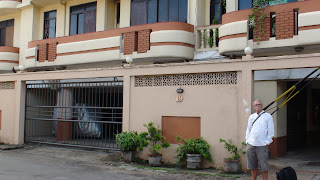Asian Court Creatures
We are now somewhat comfortable living in Asian Court Apartments on Milagiriya Avenue in Bambalapitiya, Colombo 4. The apartment, scrubbed by us after long days of language training, is liveable, at least temporarily. It's only saving grace is a little view of the ocean. The place is riddled with cock roaches, but this is true of everywhere in the tropics. Last night, we walked home from the shops and cockroaches scuttled everywhere. The ground was crawling with them. Bill is our cock roach killer. I can't do it. I mean I could happily kill them, but I can't stand being close to them. They fly and often fly directly towards our heads. When we spy one in the house, Bill sneaks upon it with the very large can of aerosol Mortein spray, gleefully giving them a good shot of the white poison. Within seconds, they roll over onto their back, legs up in the air and expire. Each time, Bill exclaims, "Bastards!" as he picks the dead roach up, his fingers thick...



Comments
Post a Comment